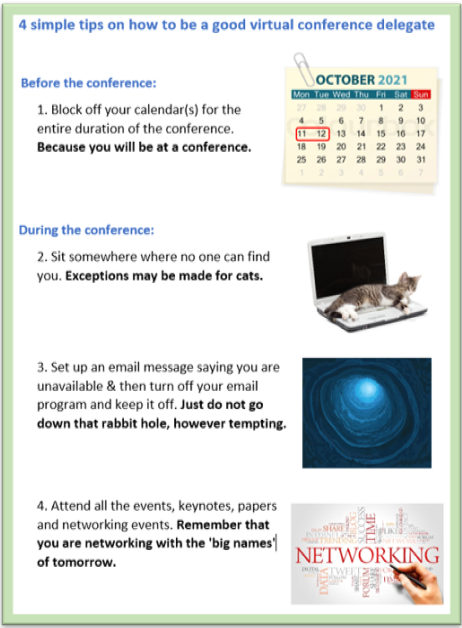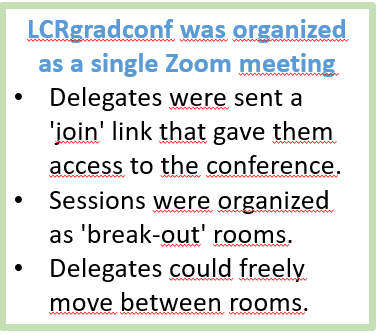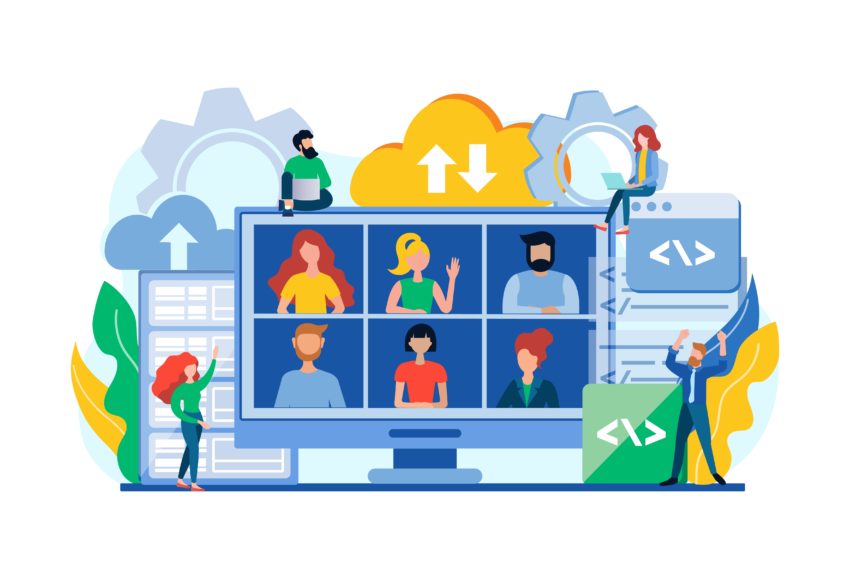Reading Time: 5 minutes read

NEWSFLASH: My research group at Inland Norway University of Applied Sciences just hosted an enormously successful and highly interactive international research conference. One hundred and one linguists gathered to discuss learner corpus research, present papers and posters, exchange ideas and extend their professional network, chat and make new friends.
No one in our local community noticed that their city was a temporary home to so many LCR researchers, as LCRgradconf was held online. Members of my research group worked (literally) night and day to host an amazing event, with delegates in times zones ranging from UTC -11 to UTC +12 (we are UTC +2).
Although a child of the pandemic, our virtual conference was no measly second-rate option. Rather, we have chosen to embrace our hard-won knowledge from the past year and continue offering top-class, low-cost digital experiences for researchers around the globe.
Virtual conferences = sustainability and accessibility
Beyond high quality papers, poster and plenary sessions, a successful conference requires only two main ingredients:
- conference delegates and
- social/networking sessions to allow for active interaction between delegates.

Both of these are more or less ensured at ‘traditional’ conferences because conference delegates are physically removed from their everyday settings, and most conferences set up all sorts of mingling events to foster interaction.
Put 100 researchers in a room together, add drinks and finger food, and let them mingle. The result? Collaboration and networking (at least for the extroverts among them).
So…how to foster successful virtual conferences?
For researchers:

For research institutions:
Recognize that virtual conferences are just that: Conferences!
Allow your researchers the uninterrupted time they need to fully immerse themselves in the conference events.
Remember that these conferences are far less costly than physical ones, saving travel expenses and time (and the environment).
For organizers of virtual conferences:
Virtual conferences need to offer sessions where researchers can ‘chat’ (to use the jargon of Zoom). Conference delegates need to be activated, to do more than passively digest information during keynotes and paper presentations.

Here are some suggestions that work:
- Keep a Reception room continuously open and staffed: a room delegates may join at any time. Although you never know who will find here, you do know that SOMEONE will always be there to chat (with their camera on 🙂 ) For LCRgradconf, delegates entered our Reception room when they clicked on the Zoom join link.
- Offer ‘continuing the conversation’ chat sessions after plenary talks. At ‘traditional’ physical conferences, a plenary talk often consists of a 45-minute addresse followed by 15 minutes of Q&As, before everyone moves on to next point on the progam. The virtual conference format easily allows us to offer an optional & extended chat: people can ‘sneak out’ after the main session if they choose or stick around & talk more with the keynote speaker and other delegates.

- Offer themed chat sessions, kicked off by a selected scholar to get the conversation rolling. For example, LCRgradconf offered a chat session on the theme of work/life balance and another on the theme of using social media for academic purposes — both introduced by members of the LCR community who were known to be particularly engaged with these topics.
- Offer ‘meet the expert’ sessions, giving delegates to chat with senior researchers in the field, including the conference’s keynote speakers.

- Don’t forget Quiz night (or morning or afternoon, depending on time zone). Divide the delegates into random teams and let them at it! Try out the LCRgradconf quiz here, with the answer key here!)
- Set up extra rooms for impromptu meetings between delegates: virtual meeting rooms. Delegates can then arrange meetings themselves & have somewhere to talk.
- Encourage delegates to actively use the written chat function of Zoom, to send questions and comments either to selected individual delegates, or to everyone present. Take advantage of both the spoken and written interaction that virtual conferences allow for!
Do we have all the answers? Nope. This is just the start of a long conversation!
Want to read more?
